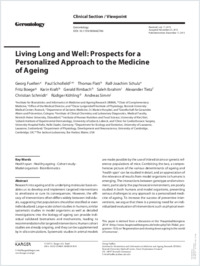Living long and well: prospects for a personalized approach to the medicine of ageing
- Fuellen, G. Institute for Biostatistics and Informatics in Medicine und Ageing Research (IBIMA), Rostock University Medical Center, Rostock, Germany
- Schofield, P. Department of Physiology, Development and Neuroscience, University of Cambridge, UK - The Jackson Laboratory, Bar Harbor, Maine, USA
- Flatt, Thomas Department for Ecology and Evolution, University of Lausanne, Switzerland
- Schulz, R.-J. Department of Geriatric Medicine, St. Marien-Hospital, Cologne, Germany
- Boege, F. Institute of Clinical Chemistry and Laboratory Diagnostics, Medical Faculty, Heinrich Heine University, Düsseldorf, Germany
- Kraft, K. Chair of Complementary Medicine, Rostock University Medical Center, Rostock, Germany
- Rimbach, G. Institute of Human Nutrition and Food Science, University of Kiel, Kiel, Germany
- Ibrahim, S. Lübeck Institute of Experimental Dermatology, University of Lübeck, Lübeck, Germany
- Tietz, A. Gesellschaft für Gesundes Altern und Prävention, Cologne, Germany
- Schmidt, C. Office of the Medical Director, Rostock University Medical Center, Rostock, Germany
- Köhling, R. Oscar Langendorff Institute of Physiology, Rostock University Medical Center, Rostock, Germany
- Simm, A. Clinic for Cardiothoracic Surgery, University Hospital Halle, Halle (Saale), Germany
-
2016
Published in:
- Gerontology. - 2016, vol. 62, no. 4, p. 409–416
English
Research into ageing and its underlying molecular basis enables us to develop and implement targeted interventions to ameliorate or cure its consequences. However, the efficacy of interventions often differs widely between individuals, suggesting that populations should be stratified or even individualized. Large-scale cohort studies in humans, similar systematic studies in model organisms as well as detailed investigations into the biology of ageing can provide individual validated biomarkers and mechanisms, leading to recommendations for targeted interventions. Human cohort studies are already ongoing, and they can be supplemented by in silico simulations. Systematic studies in animal models are made possible by the use of inbred strains or genetic reference populations of mice. Combining the two, a comprehensive picture of the various determinants of ageing and ‘health span' can be studied in detail, and an appreciation of the relevance of results from model organisms to humans is emerging. The interactions between genotype and environment, particularly the psychosocial environment, are poorly studied in both humans and model organisms, presenting serious challenges to any approach to a personalized medicine of ageing. To increase the success of preventive interventions, we argue that there is a pressing need for an individualized evaluation of interventions such as physical exercise, nutrition, nutraceuticals and calorie restriction mimetics as well as psychosocial and environmental factors, separately and in combination. The expected extension of the health span enables us to refocus health care spending on individual prevention, starting in late adulthood, and on the brief period of morbidity at very old age
- Faculty
- Faculté des sciences et de médecine
- Department
- Département de Biologie
- Language
-
- English
- Classification
- Biological sciences
- License
-
License undefined
- Identifiers
-
- RERO DOC 324307
- DOI 10.1159/000442746
- Persistent URL
- https://folia.unifr.ch/unifr/documents/307587
Statistics
Document views: 111
File downloads:
- pdf: 135
